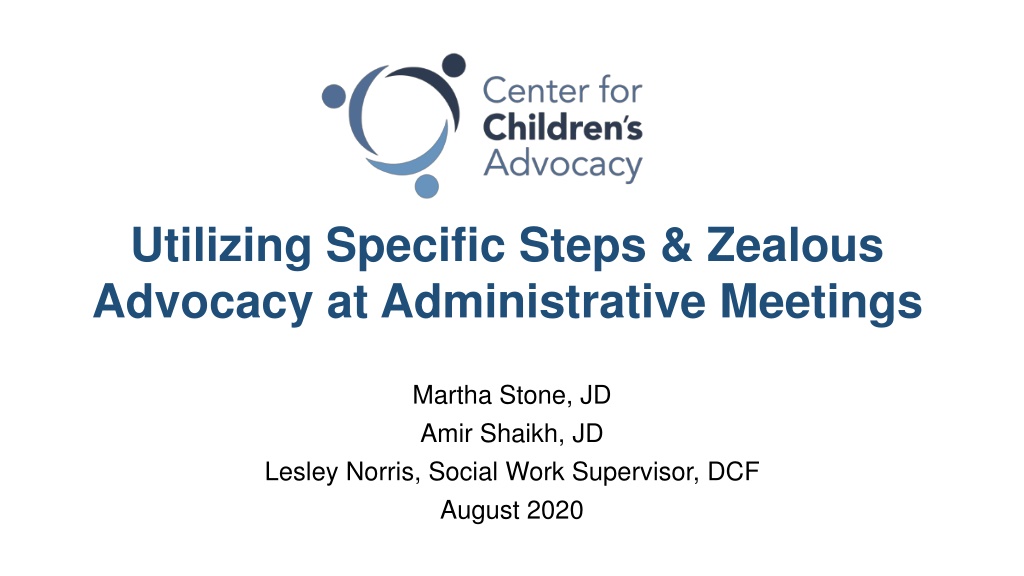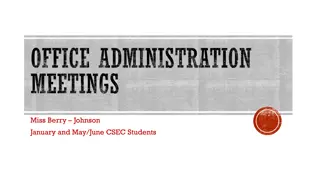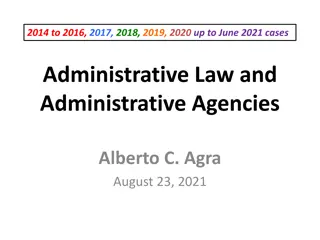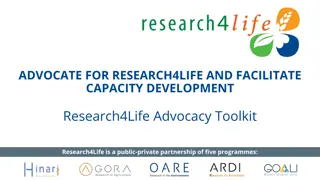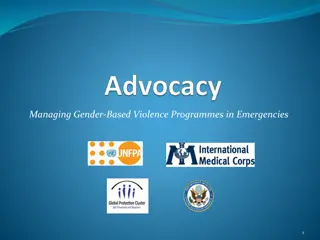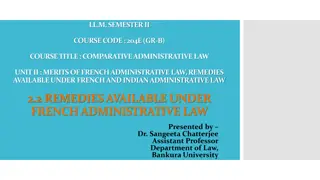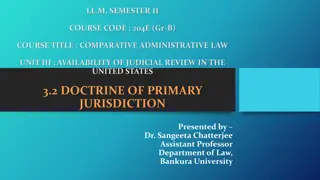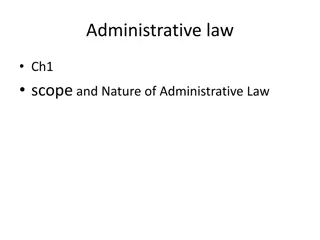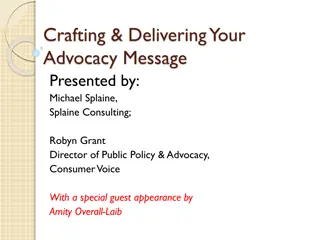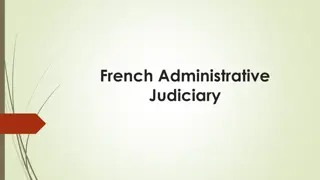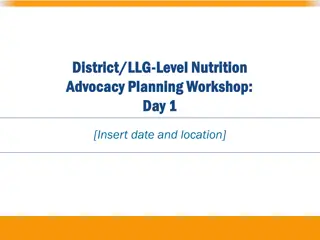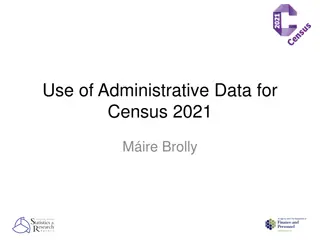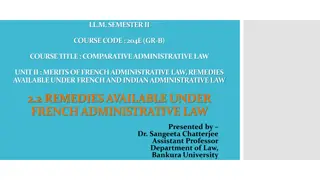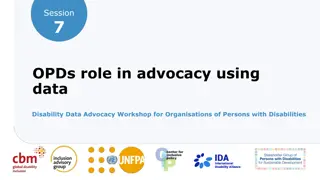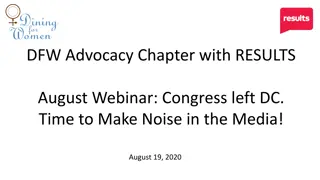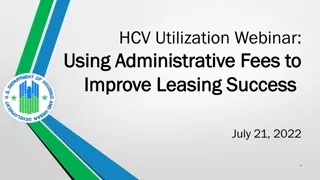Strategies for Zealous Advocacy at Administrative Meetings
Learn about the importance of zealous advocacy in administrative meetings to ensure clients' voices are heard and protect them from adverse outcomes. Explore topics like removal meetings, permanency teamings, case reviews, and more. Discover the critical role of considered removal meetings, the process of representing youth, and essential steps for effective advocacy. Gain insights into advocating for clients effectively in administrative settings.
- Zealous Advocacy
- Administrative Meetings
- Considered Removal
- Advocacy Strategies
- Client Representation
Download Presentation

Please find below an Image/Link to download the presentation.
The content on the website is provided AS IS for your information and personal use only. It may not be sold, licensed, or shared on other websites without obtaining consent from the author. Download presentation by click this link. If you encounter any issues during the download, it is possible that the publisher has removed the file from their server.
E N D
Presentation Transcript
Utilizing Specific Steps & Zealous Advocacy at Administrative Meetings Martha Stone, JD Amir Shaikh, JD Lesley Norris, Social Work Supervisor, DCF August 2020
Zealous Advocacy at Administrative Level Why is zealous advocacy critical? Ensure client s voice is heard Protect client from adverse outcomes Important decisions made Modifications to plans as necessary cca-ct.org
Todays Topics Considered Removal Meetings Permanency Teamings Administrative Case Reviews and ACRI oCase Plans oSix Month Reviews oAdolescent Transition Plan Conferences Administrative Hearings cca-ct.org
Considered Removal Meetings Required for all cases in which DCF is considering immediate removal of child from home based on identification of safety factor Must occur prior to legal or administrative decision to assume custody of child, except if immediate, imminent risk to safety of child if immediate protection were delayed When the case is court-involved & there s an order regarding custody, placement or visitation (including an Order of Protective Supervision), DCF must hold a considered removal meeting. DCF Policy 21-2-1 cca-ct.org
Considered Removal Meetings Notice to parents & guardians, and DCF support of their attendance oWith permission, additional invitations to relatives, supports, service providers & parents attorneys Child s attorney to be notified in writing at least 5 days prior, except if immediate removal has been authorized Mandatory attendance by SW & supervisor Facilitated by Considered Removal Facilitator, outside chain of command of assigned staff Request Conference Call line if you cannot attend in person DCF Policy 21-2-1; DCF Practice Guide 21-2-1 cca-ct.org
Removal Meetings Representing Youth Preparing child/youth client Developing safety plan/family arrangement Assuring child/youth voice at table Advising client not to say something that can later be used against them cca-ct.org
Removals from Out-of-Home Placement Prior to moving a child in an out-of-home placement, DCF must: Provide written notice to foster parent, child & child s attorney oIncludes notice of hospitalization or respite placement, and if child/youth absconds from care Give 10 calendar days prior notice, unless emergency (and then, within 2 days following removal) Keep child/youth in placement during 10 day notice period or pending resolution of admin hearing CGA 46b-129(j)(4); DCF Policy23-4 cca-ct.org
Permanency Teamings Permanency Team: Comprised of the child s natural network birth parents, extended family, professional supports, attorneys Purpose: oEnsure decisions are made on behalf of child with his/her active participation (or voice), and active participation of parents, family members & support network; and oSupport continuity of safe family relationship & connections with other caring adults DCF Policy 21-2; DCF Practice Guide 21-2 cca-ct.org
Permanency Teamings Mix of individual & joint conversations, and large team meetings Joint Conversation: Should initially occur between parents, foster parents, and child within 3-5 days of child entering care oShould then be ongoing throughout life of case (See DCF PG 21-2) Large team meetings: Typically every 6-8 weeks oBrings all members of PT together to plan collaboratively, coordinate supports & services, and share decision making. oREQUIRED FOR: development of Family & Child In Placement plans; prior to change in placement; prior to change in permanency goal; prior to return home or placement in kinship care cca-ct.org
Administrative Case Review: Case Plans Review of family case plan and child in placement (CIP) case plan must occur within 60 days of the child s entry into care, and at least every 6 months thereafter. DCF Policy 5-2; DCF Case Planning Practice Guide (20-1PG) at pp. 21-24 Plan reviewed by social work supervisor in case review unit to address strengths and needed improvements cca-ct.org
Administrative Case Review Meetings Invitees: Parents, Attorneys for Parents & Children, Child (if 12+), Other service providers with 21 days advance written notice DCF Policy 5-2; DCF Case Planning Practice Guide (20-1) DCF Updated Process for Consolidated ACR (effective 9/1/2018) Can be rescheduled at request of parent or child s attorney DCF Case Planning Practice Guide (20-1) Conference Call number available for every meeting Request final Case Plan and ACRI 30 days after meeting cca-ct.org
Advocating for Parents at ACR Advocate for specific (ADA compliant) services Document in case plan: oDCF s obligation to make timely referrals oVisitation plan (including additional visits) oAny disagreements with case plan oBarriers to compliance Be sure reunification date is properly estimated Remember the Specific Steps! In re: Elijah C., 326 Conn. 480 (2017) cca-ct.org
Advocating for Child/Youth Clients at ACR Ensure youth participation if over age 12 (if s/he wants to) Propose additional visitation with anyone identified as a support Ensure compliance with DCF Adolescent Policy 28-1 (e.g. mentoring, tutoring, life skills, senior year expenses, clothing vouchers, transitional services, post-secondary educational plan) Plan should address educational needs, e.g. special education, Birth to Three, preschool, educational stability, after school progs Plan should address MDE recommendations cca-ct.org
Administrative Case Review Instrument (ACRI) 30 days after ACR, request final case plan and ACRI ACRI ranks areas of case plan: STRENGTH or AREA NEEDING IMPROVEMENT Can be used at TPR trial to show lack of reasonable efforts oServices should be in least-restrictive environment; home or community-based; used to help maintain placement cca-ct.org
Special Issues in Advocating for Adolescents All youth in care 14+ should receive adolescent planning; committed youth 14+ should receive Adolescent Specialist SW. Adolescent Transition Plan (ages 16+) shall include specifics about: o Anticipated date youth will leave care o Names & contact info for at least 3 significant adults in youth s life o Anticipated living arrangements o Estimated budget o Sources/amount of income o Health insurance o Education o Local opportunities for mentoring o Continuing support services, including how to access benefits o Workforce supports & employment services o Immigration services Adolescent Transition Plan Conference ACR to be held within 90 days of youth s discharge from care, to ensure youth has a concrete plan. DCF Policy 28-1 cca-ct.org
Adolescent Services and Benefits Access to Adolescent Specialist Life Skills Education & Training Post Secondary Education Plans & Funding Credit Reports Mentoring Driver s education/driver s license CHEER (Community Housing Employment Enrichment Resources) CHAP (Community Housing Assistance Program) Case Management Services DCF Policy 28-1; DCF Practice Guide 28-1 cca-ct.org
Administrative Hearings Hearing Officers are impartial DCF employees from Administrative Hearings Unit Format: Witness testimony, exhibits, cross examinations, closing arguments. Relaxed rules of evidence. Clients may bring attorneys and/or non-attorney advocates. Burden of proof is on DCF by a fair preponderance of the evidence. DCF Policy 6-5 cca-ct.org
Types of Administrative Hearings Case Plan Hearings Educational Stability Hearings Fair Hearings Licensing Hearings Out-of-state Placement Hearings Removal Hearings Subsidy Hearings Substantiation Hearings Voluntary Services Hearings DCF Policy 6-5 cca-ct.org
Case Plan Hearings Determines if DCF s case plan is appropriate to needs of child & consistent with resources, DCF regulations & policy. oE.g. Visits, sibling visits, therapy, services for your client oIssue cannot already be pending in court Child, parent, or legal guardian request in writing. Hearing scheduled within 30 days of receipt of request; decision within 15 days. DCF Policy 6-5 cca-ct.org
Questions? Martha Stone, JD mstone@cca-ct.org Lesley Norris Lesley.Norris@ct.gov Amir Shaikh, JD amirshaikh@mac.com cca-ct.org
